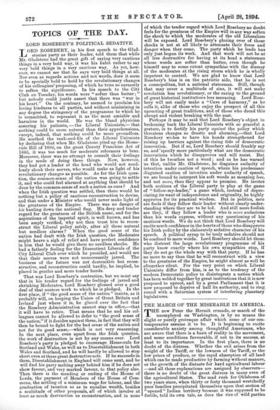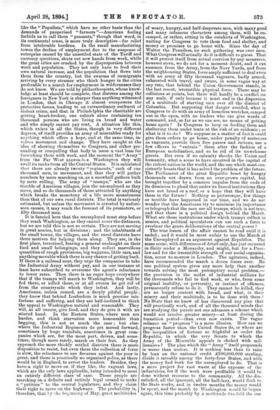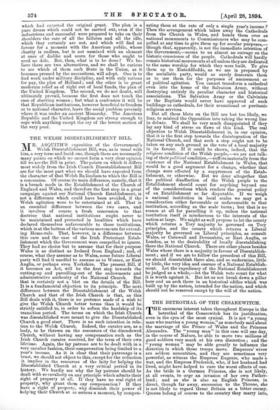THE MARCH OF THE MISERABLE IN AMERICA_ T HE new Peter
the Hermit crusade, or march of the unemployed on Washington, is by no means the slight or purely grotesque affair which some of our con- temporaries assume it to be. It is beginning to excite considerable anxiety among thoughtful Americans, who. are aware that there is a basis of reality in the movement, and some conditions favourable, if not to its success, at least to its importance. In the first place, there is no. doubt of the distress. Whether the evil arises from the weight of the Tariff, or the lowness of the Tariff, or the low prices of produce, or the rapid absorption of all land which can be made productive by farming without manure,. or the growth of the distaste for hard agricultural labour —and all these explanations are assigned by observers— there is no doubt of the great distress in many even of the agricultural States. The mad rush for Oklahoma of two years since, when thirty or forty thousand wretchedly poor families precipitated themselves upon that section of " opened " Indian territory because it was supposed to be told its own tale, as does the rise of wild parties like the "Populists," which have no other basis than the demands of pauperised " farmers "—American feeling forbids us to call them " peasants," though that word, in its continental sense, is more truly descriptive—for relief from intolerable burdens. In the small manufacturing towns the decline of employment due to the suspense of enterprise caused by the unsettled state of the Tariff and currency questions, shuts out new hands from work, while the great cities are crushed by the disproportion between work and population. They not only have to feed their own natural increase, and the population that flows into them from the country, but the swarms of immigrants arriving by every steamer who think hunger in the cities preferable to a search for employment in wildernesses they do not know. We are told by philanthropists, whose know- ledge at least should be complete, that distress among the foreigners in New York is sharper than anything witnessed in London, that in Chicago it almost overpowers the protective forces, leading to an extraordinary outburst of violent crime, and that in Philadelphia the charitable are getting heart-broken, one suburb alone containing ten thousand persons who are living on bread and water and who simply cannot pay rent, A situation like this, which exists in all the States, though in very different degrees, of itself provides an army of miserables ready for anything which offers a hope, and at the same time, in- volves movement and change. They have caught at the idea of showing themselves to Congress, and either per- suading or compelling that body to issue a vast loan for furnishing them with work, and the moment the "Army" from the Far West approach( s Washington they will swell its ranks from all the Central States. It is calculated that there are already twenty "regiments," each of one thousand men, in movement, and that they will gather numbers by mere marching on, as a snowball gathers bulk by mere rolling. The army of "tramps," who are the trouble of American villages, join the unemployed as they move, and so do thousands of those attracted by anything which breaks the monotony of a life more monotonous than that of our own rural districts. The total is variously estimated, but unless the movement is arrested by unfore- seen causes, it may reach the forecast of its promoters, or fifty thousand men.
It is fancied here that the unemployed must stop before they reach Washington, as they cannot cover the distances, but we are told this is not so certain. They are not moving in great armies, but in divisions ; and the inhabitants of the small towns, the villages, and the rural districts have three motives for helping them along. They are, in the first place, terrorised, fearing a general onslaught on their food and small belongings, and they collect marvellous quantities of rough provisions, big waggons, little cars, and anything movable which there is any chance of getting back. If there is a railroad near, they urge the companies to take the Industrial Army without pay, and in one instance at least have subscribed to overcome the agent's reluctance to lower rates. Then there is an eager hope everywhere that if the tramps will march to Washington, they will be fed there, or killed there, or at all events be got rid of from the countryside which they infest. And lastly, Americans, unless roused, are a deeply pitiful people ; they know that behind Loaferdom is much genuine mis- fortune and suffering, and they are half-inclined to think the appeal to Washington natural and reasonable. They will, at all events, give food, and they do give it with no stinted hand. In the Eastern States, where men are harder, and think starvation more honourable than begging, this is not so much the ease ; but else- where the Industrial Regiments do get moved forward, sometimes by huge trainfuls, sometimes in great com- panies which are, for the most part, driven, and some- times, though more rarely, march on their feet. As they approach the more thickly settled districts there is more disposition to resist, but even there the collection of force is slow, the reluctance to use firearms against the poor is great, and there is practically no organised police, as there would be in England, to arrest the leaders. Besides, they have a right to move on if they like, the vagrant laws, which are the only laws applicable, being intended to meet an entirely different class of case. These people are marching on a definite and entirely legal errand to make a " petition" to the central legislature, and they claim their right to move on the highways. The probability is, of weary, hungry, and half-desperate men, with many good and many infamous characters among them, will be en- camped, or rather, sitting in the outskirts of Washington, waiting for Congress to vote them food and shelter, and money or promises to go home with. Since the day of Walter the Penniless, no such gathering was ever seen. What Congress will actually do it is difficult to guess. That it will protect itself from actual coercion by any measures, however stern, we do not for a. moment doubt, and it can summon from the Army, from the Navy Yards, and from the neighbouring States, force amply sufficient to deal even with an army of fifty thousand vagrants, badly armed, exhausted with travel, and aware, in some vague way at any rate, that behind the Union Government stands, in the last resort, irresistible physical force. There may be collisions at points, but there will hardly be a conflict on any scale, if only because it must end in the dispersion of a multitude of starving men over all the district of Columbia. But supposing that danger avoided, what is Congress to do with an army of homeless wretches, camped out in the open, with no leaders who can give words of command, and, so far as we can see, no means of getting home again ? Is Congress to keep on feeding them and sheltering them under tents at the risk of an epidemic ; or what is it to do ? We suppose as a matter of fact it could give them orders to go home, under penalty of sentences as vagrants, provide them free passes and rations, use a few officers to " entrain " them after the fashion of a European mobilisation, and so be rid of its unwelcome guests. But even if no calamity shocks the Union and humanity, what a scene to have occurred in the capital of the richest nation in the world, and the one which most con- sistently boasts that it has solved the problem of the future. The Parliament of the great Republic beset by hungry thousands not drawn from an over-grown capital, but brought together by a common impulse from the ends of its dominion to plead that under its famed institutions they have not bread or a roof, or a hope that they will have them in the future ! Nothing so picturesque, few things so terrible have happened in our time, and we do not wonder that the Americans try to minimise its importance or telegraph that the men are all tramps, which is not true, and that there is a political design behind the March. What are those institutions under which tramps collect in armies, and political speculators can use such a force to overbear the grave deliberations of the central power ?
The true lesson of the affair cannot be read until it is ended ; and it would be most unfair to use the March of the Unemployed as an argument against Republics. The same scene, with differences of detail only, has just occurred in Sicily under a Monarchy, and might, but for a Poor- law and for the irresistible strength of our social organisa- tion, occur to-morrow in London. The agitators, indeed, have recommended the march a dozen times over. No. one political system gives any more help than another towards solving the most peremptory social problem,— the provision in the midst of industrial millions for the thousands who fail to find work, or who, from some original inability, or perversity, or instinct of idleness, permanently refuse to do it. They cannot be killed, they are no longer content with bread, and what, in their misery and their multitude, is to be done with them ? No State that we know of has discovered any plan that will practically work, and of all the thousand minds that are studying the puzzle not one advances a scheme which would not involve greater misery—at least during the transition period—than even now exists. The vague reliance on " progress" is a mere illusion. How can we progress faster than the United States do, or where are the inequalities of fortune so frightful as under the Republic, in which the very Senate to which the Army of the Miserable appeals is choked with mil- lionaires? The plan which the " Army " itself propounds is worse than useless. It is nothing less than to raise by loan on the national credit £100,000,000 sterling, divide it rateably among the forty-four States, and with the money find work for the unemployed to do. That is a mere project for vast waste at the expense of the industrious, for if the work were profitable it would be done without recourse to the community. All the dis- satisfied, all the ignorant, all the half-lazy, would flock to the State works, and in twelve months the money would be spent, and the march to Washington would be begun which had extorted the original grant. The plan is a pure dream which could not be carried out, even if the industrious and successful were prepared to take on their shoulders the care of all the failures and all the idle, which they certainly are not, and which will find. no favour for a moment with the American public, whose charity is endless, but is not unmixed. with an element at once of dislike and scorn for those who ought to need no dole. But, then, what is to be done ? We be- lieve there are two alternatives, and we shall be curious to see which of them each State in the Union, as it becomes pressed by the necessitous, will adopt. One is to find. work under military discipline, and with only rations for pay, the plan of Holland ; and the other is to grant moderate relief as of right out of local funds, the plan of the United Kingdom. The second, we do not doubt, will ultimately prevail, because the first does not touch the case of starving women ; but what a confession it will be that Republican institutions, however beneficial to freedom or to national character, leave the social problem precisely where it was under an ancient Monarchy. The American Republic and the United Kingdom are strong enough to cope with anything except the cry of the lowest section of the very poor.




















































 Previous page
Previous page